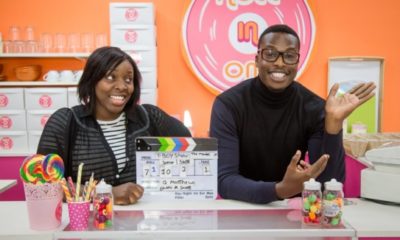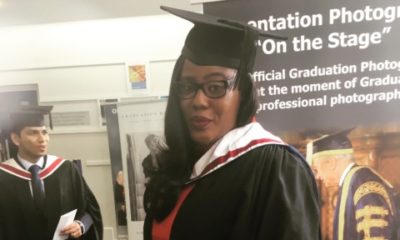Career
Move Back To Nigeria: A Big Advocate for Personal Drive, Andrew Osayemi Shares his Passion for Telling the Story of Nigerians In the Diaspora
 Move Back to Nigeria is a series on BellaNaija which aims to encourage young and not-so-young professionals in the diaspora who are trying to make the decision of whether to move back to Nigeria. In collaboration with the brilliant team at MoveBackToNigeria.com, we hope to bring you a weekly interview with individuals who have successfully made the leap, considering the leap, as well as those who have tried it and realized it is not for them. MoveBacktoNigeria.com’s mission is to showcase stories of Nigerians abroad who have moved back home and are taking giant strides, often against all odds and to serve as inspiration to others. This, however, does not preclude us from sharing stories of the people who have moved back and are facing various challenges.
Move Back to Nigeria is a series on BellaNaija which aims to encourage young and not-so-young professionals in the diaspora who are trying to make the decision of whether to move back to Nigeria. In collaboration with the brilliant team at MoveBackToNigeria.com, we hope to bring you a weekly interview with individuals who have successfully made the leap, considering the leap, as well as those who have tried it and realized it is not for them. MoveBacktoNigeria.com’s mission is to showcase stories of Nigerians abroad who have moved back home and are taking giant strides, often against all odds and to serve as inspiration to others. This, however, does not preclude us from sharing stories of the people who have moved back and are facing various challenges.
This week we are delighted to bring you an interview with Andrew Osayemi, Managing Director of MTA Productions, the producers of popular UK Nigerian TV series, ‘Meet the Adebanjos’. In this interview you will learn how he quit his high flying Investment Banking job in London to set up MTA Productions. Hear in his own words, the challenges he faced, his views on the advantages of doing business in Nigeria, and some really blunt advice for ‘would be’ entrepreneurs thinking of setting up shop in Nigeria. We hope you find his key points as useful as we have.
Thank you for speaking with us. Can you please introduce yourself and tell us what you do?
My name is Andrew Osayemi. I was born and bred in the UK (Peckham, London); I am of Nigerian descent and I run a T.V. production company which is focused on African TV productions. In the past, I have worked in finance.
That’s an interesting career switch. But before we explore that, can you please take us through your educational background?
For secondary school, I attended a school in London called St Duncan’s College and after that, I took a gap year and then went on to Warwick University to study economics.
Why economics?
At the time, a degree in economics guaranteed you a wide range of job opportunities and I essentially just wanted to get a degree from the university where I would be guaranteed a job afterwards.
And did a job come next?
Yes. While I was studying, I got introduced to investment banking and went on an internship in my penultimate year and then got accepted to the Royal Bank of Scotland (RBS) Graduate Programme in 2005. So, upon graduating from university, I started work on their securities trading programme in 2005.
How did you find it?
It was really cool but intense. There was a lot of pressure – being on the trading floor where it is high-energy and where millions of dollars are made and lost each day. The early starts were tough – having to be at work between 6.30am and 7am every day but to be honest though, I was just happy to have a well-paying job. My parents came to the U.K. in the early 1980’s and their whole quest was for their children to get good education and good jobs. So I was just happy to have a good job and make them proud.
How long were you at RBS?
I was at RBS for five years, starting on the graduate trading programme, then moving onto their foreign exchange trading division in London and got promoted to a senior trading role in New York for two years.
Your moving to New York must have been quite exciting?
New York again was a lot of fun. It was a completely different world and was the period of my life where I got a sense of people doing amazing things that were not just finance related. I noticed people working in different aspects of the creative industry, fashion and several other sectors. I enjoyed the move and I must say I enjoyed the two years I spent there.
Did you go back to London?
Yes, I came back to RBS. I wanted to come back home and what I found was that, the market in banking was completely different from when I left due to the whole credit crunch situation. The opportunities were not really there for me anymore and so I left.
You left the banking job?
Yes, in March of 2010. This is when I switched careers.
Please tell us about that.
Well, while I was working in the banking industry, my current business partner, Debra, had been working in TV production. She had always been talking about production from a business angle and we often discussed different markets. We discussed the UK market in terms of black productions as well as Africa and Nigeria in particular. We could see the growth and success of Nollywood films and wanted to replicate the same in the TV market. We then started conducting more and more research on what type of TV series were being produced and realised that there was a big gap in the market in regards to comedy TV series. There were a lot of soaps, drama and reality TV shows but not as many comedy series so we decided to start there. We also discovered there were no shows that focused on an African family living abroad which is how we came to develop ‘Meet The Adebanjo’s’, a British Nigerian family, living in London.
Considering your very different background, were you worried as to how this would go?
Not really. The truth is I didn’t know a single contact for a TV station in Africa that I could connect to but I just had faith that if we put in hard work, trust in God and all of that, we could create a great product. We would just focus on the product first and the selling later and definitely make some kind of breakthrough.
So how was the initial start-up process, setting up the production company. Was that difficult
MTA Productions is based in UK and Nigeria with our distribution across Africa. This is where I would say that great businesses are all about partnerships, and having the right people on board. For example my business partner Debra is experienced in TV production so she understands how to create scripts, how to get the right crews e.t.c I, on the other hand, am able to tap into a great diaspora investment community, fund raise and travel around Africa to make key business relationships.
Your start-up capital was sourced from your personal networks?
From some of my personal networks and from others investors who believed in our vision. The vision we had was to be the biggest production company in Africa, initially focusing on comedy but eventually moving into every genre. When you look at Africa, you have over fifty two different countries and everyone has their own independent TV market and network. My vision was that you could create content and sell it to all the different countries and make money. If you can create and capture all the different markets that you can sell to, you are going to have a pipeline to distribute your contents to all the different TV stations across Africa because these countries have at least ten to twenty different TV stations and that is a whole lot of buyers for the content. From those investors we were able to start the company with over £100K of investment.
Interesting. So, when did you set up MTA Productions?
MTA Productions was formed in 2010- so it has been in existence for 4 years. I am the managing director and run the business aspect of the company. My business partner Debra Odutuyo is the creative director of the company and runs the creative process of the company. I want to give a shout out to our investors who have provided great support over the last 4 years – many are Nigerians working abroad in US and UK and who want to support business in Africa.
How will you say the four years have turned out?
The journey has been interesting and challenging. We created the products and didn’t have any buyers or any relationships with any of the TV stations. So, In 2010 to 2011/2012, I found myself going across Africa, first to Nigeria to build a relationship with Silver Bird and then AIT, and then South Africa to build a relationship with SABC and then went on to Uganda, Ghana and elsewhere building relationships, it was a tireless struggle. A lot of hard-work too but the vision of the company was to build relationships first which would produce a distribution network for all our future shows. At the very beginning, we under-estimated the hard-work involved. I thought within a year, money would be flowing from all corners, but the markets were already established and breaking into them was not just easy. You have to build up the trust, people have to know who you are and I must say that sometimes, it is not about the products but people have to also know who you are. You go out there, build a relationship, some deals will happen, some will not, but you know, that’s the way it goes.
How long did it take you to then establish the brand?
It was a lot of work and I would say it was battle of the mind too. In the beginning, you are focused on profit and also on market share. I was quite naive by going for both at the beginning which is profit and market share together but sometimes, you just have to go for market share and forget about profit. Build a reputation about your product to be what people love and trust and then, worry about profit. Owning and running a business is not easy and that is what i have learnt, mostly on the job.
Do you regret your entry into it?
I don’t regret it at all. Like I said, if you aim big and succeed, you will be known for something. This what drove me through the tough periods where I told myself, ‘you know what, I am doing something where, in the long run, I will be known for something positive rather than just quitting’. Which is why when I was invited to speak at the African Business Conference at Harvard Business School, I felt justified and believe it is just the beginning.
Where it started paying off, was when we were able to sell season one and pre-sell season two of MTA to South African Media giant’s MNet. They pre-ordered twenty four episodes for the next season and that was what took the company to the next level and provided much needed funds into the company.
Is season two out now?
Season two was just released on MNet’s channel – Africa Magic across Africa on DSTV and in the UK on OHTV. We also have a new show which we produced towards the end of last year. It is about a Nigerian student who comes to live with a white family in the UK. A couple of years ago, I met this really talented online comedian called ‘Don’t Jealous Me’ who is the main character on the show. It is already being aired in London on a new channel called London live which is on free view in London and can also be viewed online (UK only).
You seem intent on telling the story of Nigerians in Diaspora. Is there any particular reason why?
Yes, that is our first focus: to tell the story of Nigerians in Diaspora. This is because we thought it was the untold story which needed to be told. Many of my parent’s friends left Nigeria as young people to the US and UK and unfortunately didn’t return. However they built families and communities and have very interesting stories working all types of jobs and raising kids which we thought would be interesting and something Africans in Africa would love to see. And based on the reactions of the fans across the world I think we are correct. Our vision for the company however is to move into doing local programmes which will be shows about Nigerians and Africans living in Africa.
This leads me to ask where you see yourself and your company in the next five years?
Like I said at the beginning, the vision is to build the biggest production company in Africa making high quality content. Our vision is to establish more and more TV shows. We currently have two at the moment which is about African’s in the Diaspora and we want to start creating local TV shows. We also want to build TV shows that travel.
The problem with a lot of TV shows in Africa, is that they don’t ‘travel’, which means they don’t have the capacity to be sold abroad which limits the profitability of the series which again impacts the budgets of the shows. We want to provide the quality and uniqueness of the show that allows African stories to travel beyond the boundaries of Africa which would lead to increased budgets! It’s a massive vision and one we can’t do by ourselves so it will rely on working together with all the stakeholders – TV Stations, sponsors and investors to ensure we can achieve our goals. There is so much potential and opportunity in African TV media and I am just privileged to be part of it and helping it grow!
Do you plan to set up shop in Nigeria or other African countries?
Yes, absolutely. We have a semi office in Nigeria at the moment, which is our distribution office and I am between both locations but as we move to do more local content, we want to permanently have our base in Lagos.
So you will be doing the big move back to Nigeria then?
Definitely, yes. It is where our main market is and in business you have to be present in your main market as that is where you can build all your key relationships. You can only get so far sending emails and speaking on the phone. In Nigeria for people to take you serious you have to be there.
Is there anything that struck you about being in Nigeria, especially considering you didn’t grow up there?
I think I like the access. Although some people would say it’s hard to get access, I would have to disagree. This is because in the UK, the TV industry is quite closed whereas in Nigeria, the system is more about entrepreneurial independent producers. So, if you have a great product, you can get access to the right people very very quickly whereas in the UK, the system is more about the TV stations dictating what goes on TV. I like the entrepreneurial access that you can get and I also like that if you have a good product, then the sky is the limit.
On a final note, what would you say to people who are inspired by your story and are possibly considering a big step in life, such as moving back to Nigeria?
I would say that for business find and form good partnerships as you can’t do everything yourself. I had no knowledge of TV, so I got a business partner knowledgeable in that field. Without her I would have failed, so having the right partnership is key. Also if you bring the passion and the business acumen and find someone who has insight and experience into what you are doing, it will help you raise finance because partnership with a knowledgeable colleague will give credibility to your business plan.
I am also a big advocate of having personal drive, though I know it can be hard and frankly, sometimes difficult, especially in a place like Nigeria. Nonetheless, just put in a hundred and fifty percent in whatever you want to do and make it work. Finally, build your network so that when you want to do anything, you will have people to support you.
Many thanks for your time and best wishes moving forward. ______________________________________________________________________________________________________
The primary objective of MoveBackToNigeria.com is to connect Nigerian professionals with various opportunities in Nigeria, ranging from recruitment drives to information & support regarding relocation processes, financial & tax advice and much more. Move Back To Nigeria also features social interest topics such as what’s on, where to live, how-to survival tips and so on. Consistently engaging with and featuring Nigerian professionals in weekly interviews, Move Back To Nigeria regularly publishes social interest articles relevant to the general public. Everyone is welcome to their online discussions & fora and you are invited to air your views & suggestions on the topical and trending matters section. For more information and further inquiries, please contact [email protected]



















